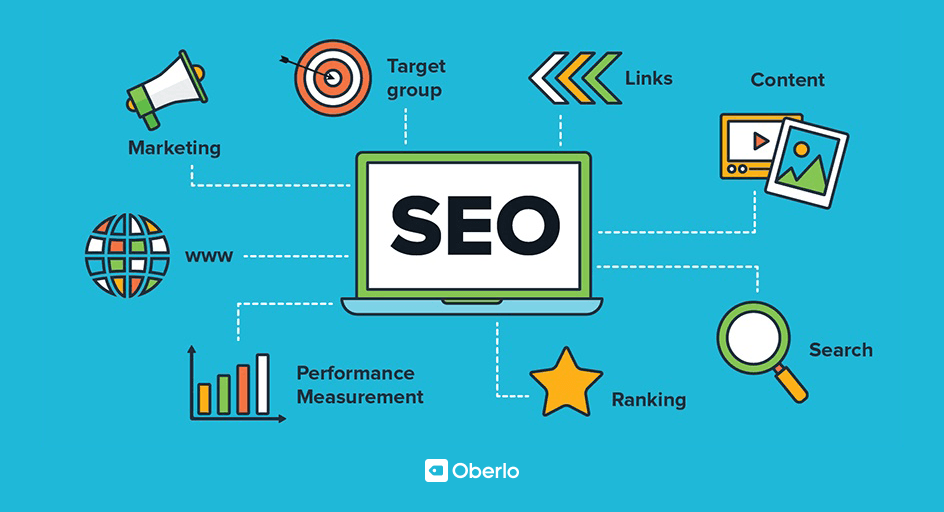Search Engine Optimization (SEO) is a crucial component of digital marketing. It refers to the practice of optimizing a website or web page to improve its visibility and ranking in search engine results pages (SERPs) with the goal of increasing website traffic and driving conversions.
SEO involves a wide range of techniques and strategies, including keyword research and optimization, on-page optimization, link building, content creation and optimization, and technical optimization. These techniques are aimed at improving various factors that search engines use to rank websites, such as relevance, authority, and user experience.
The role of SEO in digital marketing is multi-fold. First, it helps businesses to increase their online visibility, which is essential for attracting new customers and building brand awareness. By ranking higher in SERPs, businesses can reach their target audience more effectively and increase their chances of being found by potential customers.
Second, SEO helps businesses to improve their website’s user experience, which is critical for retaining visitors and encouraging them to take action, such as making a purchase or filling out a form. A well-optimized website that loads quickly has a clean and user-friendly design, and provides high-quality content is more likely to attract and retain visitors than a poorly optimized website.
Third, SEO can be a cost-effective way to generate leads and sales compared to other digital marketing channels. By targeting the right keywords and optimizing their website for conversions, businesses can attract highly qualified traffic that is more likely to convert into paying customers.
Strategies for Digital Marketing
1. Conduct keyword research:
Identify the keywords and phrases your target audience uses to search for your products or services and optimize your website content around those keywords.
2. Optimize on-page elements:
Ensure that your website’s title tags, meta descriptions, headers, and content are optimized with relevant keywords and provide a clear value proposition.
3. Build high-quality backlinks:
Build high-quality backlinks from authoritative websites in your industry to improve your website’s domain authority and increase your search engine rankings.
4. Improve website speed:
Ensure that your website loads quickly and efficiently, as slow loading speeds can negatively impact your search engine rankings and user experience.
5. Create high-quality content:
Create high-quality and engaging content that provides value to your target audience and is optimized with relevant keywords.
6. Optimize for local search: If you have a physical business location, ensure that your website is optimized for local search with relevant location-based keywords and Google My Business listing.
7. Use social media:
Use social media to promote your content and engage with your audience, which can help improve your website’s visibility and increase traffic.
8. Monitor and analyze your website’s performance:
Use analytics tools to monitor your website’s traffic, search engine rankings, and other performance metrics and make adjustments accordingly.
9. Use schema markup:
Implement schema markup to help search engines better understand the content on your website and improve your search engine rankings.
10. Stay up-to-date with SEO trends:
Stay up-to-date with the latest SEO trends and best practices, as search engine algorithms and ranking factors are constantly evolving.
Creating an effective strategy for SEO in digital marketing involves several steps:
Define your target audience:
Understand who your target audience is, their needs, pain points, and the keywords they use to search for your products or services.
Set specific and measurable goals:
Define specific and measurable goals, such as increasing website traffic, improving search engine rankings, or generating leads and sales.
Conduct a thorough website audit:
Conduct a comprehensive website audit to identify any technical issues, on-page optimization gaps, and opportunities for improvement.
Develop a keyword strategy:
To develop a keyword strategy based on your target audience’s search behaviour and intent. Use keyword research tools to identify relevant keywords and phrases to target.
Develop a content strategy:
Develop a content strategy that aligns with your keyword strategy and addresses your target audience’s needs and pain points. Create high-quality, engaging, and optimized content, such as blog posts, infographics, videos, and landing pages.
Optimize your website:
Optimize your website’s on-page elements, such as title tags, meta descriptions, headers, and content, to align with your keyword and content strategy.
Build high-quality backlinks:
Build high-quality backlinks from authoritative websites in your industry to improve your website’s domain authority and increase your search engine rankings.
Continuously improve your strategy:
Continuously test and optimize your SEO strategy to ensure that it meets your goals and delivers the desired results.
Overall, SEO plays a critical role in digital marketing. It helps businesses to improve their online visibility, attract and retain visitors, and drive conversions. By investing in SEO, businesses can achieve long-term growth and success in the highly competitive digital landscape. If you want to learn more about SEO &Digital Marketing, visit our website – CrazyWebDev Technologies! We provide knowledgeable courses at affordable prices.
Reference Image – https://www.google.com/url?sa=i&url=https%3A%2F%2Fwww.oberlo.com%2Fblog%2Fseo-tools&psig=AOvVaw0ho6FGq8FRcQh8s18NkUva&ust=1683743917809000&source=images&cd=vfe&ved=0CBEQjRxqFwoTCPDh0oPx6P4CFQAAAAAdAAAAABAE


